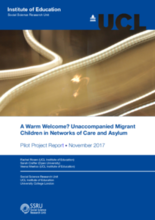This pilot project sought to investigate unaccompanied children’s experiences of care, and caring for others, as they navigate the labyrinthine asylum-welfare nexus in the UK. The researchers conducted a small-scale, exploratory case study with the following objectives:
- Begin mapping the sites and processes in which unaccompanied children build and engage with institutional, civil society and family/peer networks of care
- Explore perspectives on and experiences of care of, and by, unaccompanied children
- Analyse the geo-political contexts of unaccompanied children’s experiences of care
- Begin designing and assessing research methods, and evaluate the methodological feasibility of working with a multi-disciplinary team, including academics, third sector organisations, and (former) unaccompanied children.
This paper highlights emerging themes from the study, including the role of professional and non-professional adults involved with unaccompanied migrant children, the "cracks" in the system, contradictory requirements for asylum-seeking minors, and the complexities of navigating the "care-asylum nexus."
This pilot study has highlighted that unaccompanied children are the intended beneficiaries of state and voluntary sector efforts at care, support and protection. But, they are also subject to significant cracks and contradictory imperatives in the asylum-welfare nexus. Although unaccompanied children are involved in the care of themselves and others, this has received limited recognition by the state and by adult stakeholders in the asylum-welfare nexus. There is every indication that these caring relationships are of central importance for navigating migration journeys and the asylum-welfare nexus, and that these relationships are highly valued by this group of young people. Without understanding more about the meanings, values, and practices of the care of children by children, and without recognising its centrality in the lives of separated migrant children, this pilot study indicates that even well-meaning policy and practice can result in detrimental impacts on separated migrant children.

